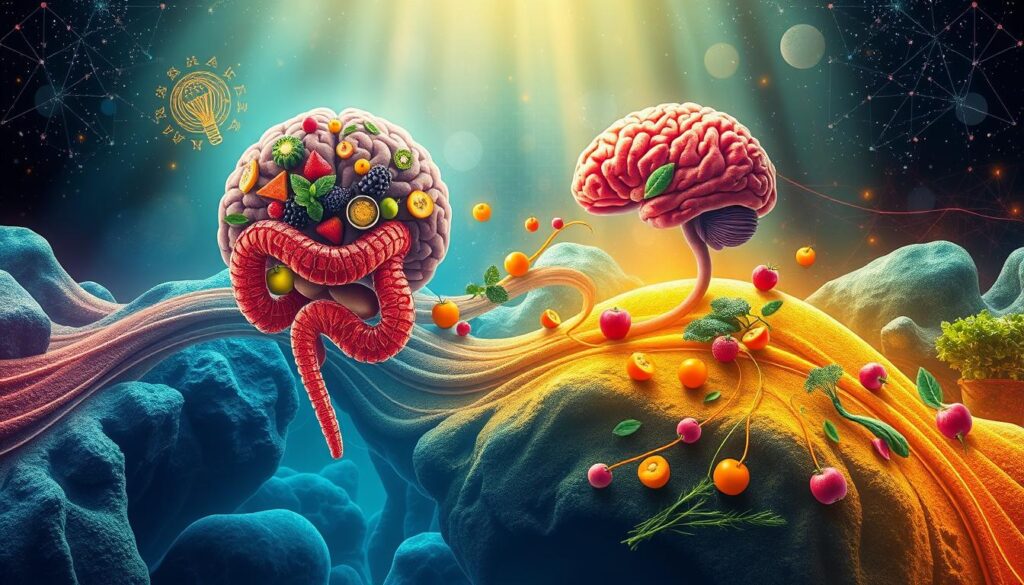In today’s world, stress and anxiety are big problems. We need good ways to handle them. Research shows that eating plants can help us feel better and be more resilient.
But why does a plant-based diet help us manage stress? It’s a question many are asking.
Key Takeaways
- Plant-based diets, rich in fruits, vegetables, whole grains, and legumes, have been linked to reduced stress and anxiety levels.
- Nutrient-dense plant foods provide essential vitamins, minerals, and antioxidants that support brain health and regulate the stress response.
- The gut-brain connection plays a crucial role, with a healthy gut microbiome contributing to better mental well-being.
- Omega-3 fatty acids, abundant in plant-based sources, possess potent anti-inflammatory properties that can alleviate stress.
- Adopting a plant-based lifestyle can be a holistic approach to managing stress and promoting overall mental and physical resilience.
Understanding Stress and Its Impact
What Is Stress?
Stress is how our brain and body react to challenges. This could be a new job, a surprise party, or homeschooling when it was the COVID shutdown. While we often see stress as bad, it can be helpful. It motivates us to face dangers or find safety.
Long-term Effects of Stress
But, long-term stress can harm our health. It messes with our immune, digestive, and heart systems. It can also cause problems like heart disease and depression.
It’s key to understand stress management and its effects on mental health for our wellbeing.
“Chronic stress can lead to health issues such as digestive problems, weight gain, elevated blood pressure, heart disease, immune system problems, skin conditions, and anxiety.”
Finding ways to manage stress and support our mental health is crucial. Practices like exercise, mindfulness, and a healthy diet can help reduce stress’s negative effects.
The Power of Plant-Based Diets
Plant-based diets are becoming a key player in fighting stress and anxiety. They are full of nutrients that help our brains work better and improve our mood.
Research shows that plant-based diets can really help our mental health. A study on 2,033 Iranian adults found that a less nutrient dense and more processed plant-based diet increased depression risk by 100% and anxiety by almost 50%. But a more nutrient dense plant-based diet lowered these risks.
Plant-based diets help reduce stress by linking our diet, gut health, and brain. Our gut and brain are closely connected. A healthy gut, which plant-based diets promote, helps us feel less anxious and stressed.
Plant-based foods are also full of antioxidants and other great nutrients Chronic inflammation, which can cause depression and anxiety, is reduced by these foods. Eating more plant-based foods can help us feel better overall.
Choosing a plant-based lifestyle can also make us feel better emotionally. Studies show that it can make us more empathetic and compassionate, which lowers stress.
In short, plant-based diets are great for managing stress and improving mental health. By eating more fruits, veggies, and whole grains, we nourish our bodies and minds. This helps us stay balanced and resilient.
Stress management through nutrition
The foods we eat can greatly help manage stress. Certain plant-based foods are packed with nutrients that fight stress. These nutrients help our bodies and minds feel better.
Nutrient-Rich Foods and Their Benefits
Vitamin C in citrus fruits like oranges is a strong antioxidant. It fights off free radicals and stress hormones. Eating foods high in vitamin C can lower cortisol levels.
Magnesium, known as the “relaxation mineral,” is also key. It helps with headaches, fatigue, and better sleep. Swiss chard, spinach, and almonds are great magnesium sources.
- Omega-3 fatty acids in fish like salmon and tuna boost energy and mental health. They also reduce inflammation, helping fight stress.
- Complex carbs in whole grains increase serotonin. They also stabilize blood pressure and provide vital nutrients during stress.
Adding these nutrient-rich, plant-based foods to your diet nourishes your body and mind. It’s a tasty way to manage stress.
“Eating a diet rich in nutrient-dense, plant-based foods can be a powerful tool in your stress management arsenal.”
The Gut-Brain Connection
The gut and brain are closely connected. What’s in our gut microbiome can greatly affect our mental health. Plant-based diets, full of fiber and plant compounds, help keep our gut healthy. This can lead to better hormone production, easing anxiety and stress symptoms.
Plant-based eating is key to managing stress and boosting well-being. Research shows diet and lifestyle play a big role in our gut health. Social stress can change our gut microbiota, affecting how we handle stress.
Stress can make us crave unhealthy foods. Diet is more important than genetics in shaping our gut microbiota. This is why what we eat matters a lot.
Short-chain fatty acids from gut microbes can control immune cells and affect brain function. They can even reduce hunger. Some probiotics in mice have lowered stress hormones, showing the gut-brain axis’s role.
“The gut microbiome has been linked to ADHD and its relation to neural reward anticipation.”
Serotonin, which makes us happy, is mostly made in the gut. The gut microbiome also produces neurotransmitters like GABA, which helps control fear and anxiety. Probiotics can boost GABA, reducing anxiety and depression in mice.

The connection between the gut and brain is complex and intriguing. It shows how our gut health impacts our mental well-being. By choosing a plant-based diet and supporting a healthy gut microbiome, we can manage stress and improve our mental health.
Omega-3 Fatty Acids: Essential for Brain Health
Omega-3 fatty acids are key for a healthy brain and managing stress. They give energy, support mental growth, and fight body inflammation. You can find them in fish and also in plants like flaxseeds, chia seeds, and walnuts.
Many studies show omega-3s are good for the brain and stress. Supplements with DHA and EPA improve memory and thinking. They also lower anxiety and depression risks.
- A study of 485 older adults with age-related cognitive decline found that those who took 900 mg of DHA daily showed better performance on memory and learning tests after 24 weeks.
- Another study demonstrated that taking 1.8 grams of omega-3s daily from fish oil supplements improved brain function in people with mild cognitive impairment (MCI).
- Fish oil supplements have also been shown to improve depressive symptoms, especially when the supplements contain higher doses of EPA.
Plant-based omega-3 fatty acids are not as easily converted to EPA and DHA as fish ones. Yet, they still help brain health and stress. Eating a variety of plant-based omega-3 sources supports your brain and stress levels.
“Omega-3 fatty acid supplementation has been shown to have a positive impact on cognitive function and brain structure, making it an important component of a stress-reducing, plant-based diet.”
Conclusion
Managing stress and anxiety is not easy, but a plant-based diet can help a lot. They help your body and mind feel better, fighting off stress.
Eating well is linked to better mental health, but it’s different for everyone. Eating lots of fruits, veggies, whole grains, and lean proteins helps. It can make you feel happier and less stressed. Drinking enough water and avoiding too much caffeine and sugar also helps.
Learning more about how plant-based diets affect our minds is important. Using these nutrition tips can lead to a happier, healthier life. Taking care of yourself, getting help when needed, and choosing plant-based foods can make a big difference. It helps you deal with stress better and live a balanced life.
Click where it says free resources and download a free 7 day plant based challenge.
Stay Connected and Enhance Your Well-Bing
- Free Training: Realign Your Wellness
- Join Our Wellness Community: Wellbeing Group on Facebook
- Take Your Wellness Assessment: Health & Sleep Checklist
- Explore More Free Resources: Wellness Resources
- Contact Us: info@clarissabooker.com
- Watch on YouTube: Clarissa Booker
Stay connected with us for tools, resources, and support on your holistic wellness journey!

